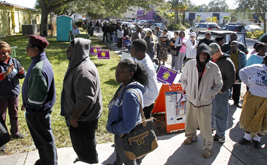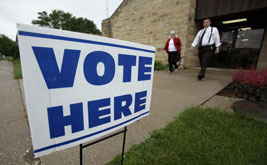Why the Voting Rights Act Likely Won’t Survive Supreme Court Review Why the Voting Rights Act Likely Won’t Survive Supreme Court Review
The Voting Rights Act is, in some ways, living on borrowed time.
Nov 14, 2012 / Brentin Mock and Voting Rights Watch
Undeterred by the Long, Slow Line Toward Democracy Undeterred by the Long, Slow Line Toward Democracy
Those long, snaking lines were about more than a vote. The people most battered and excluded from the nation's politics and economy refuse to be ignored.
Nov 7, 2012 / Brentin Mock and Voting Rights Watch
More Floridians’ Votes Challenged by Tea Party, This Time in Miami More Floridians’ Votes Challenged by Tea Party, This Time in Miami
Forty-six people in Miami-Dade County have had their votes challenged.
Nov 6, 2012 / Brentin Mock and Voting Rights Watch

Tea Party Group Blocks Florida Voters, Stops Water Handouts at Polls Tea Party Group Blocks Florida Voters, Stops Water Handouts at Polls
A Tampa group has filed dozens of last-minute voter challenges, in a troubling indication of ramped up suppression efforts. Meanwhile, as record turnout forced long lines, poll wat...
Nov 5, 2012 / Brentin Mock and Voting Rights Watch
Florida Early Voters Show Up in Huge Numbers Despite Suppression Effort Florida Early Voters Show Up in Huge Numbers Despite Suppression Effort
For two years, Florida’s Tea Party Republicans have been working to undo the huge turnout of black voters on the Sunday before Election Day. It didn’t work. ...
Oct 30, 2012 / Brentin Mock and Voting Rights Watch

In Virginia, 350 Thousand Would-Be Voters Wait for Democracy’s Slow Return In Virginia, 350 Thousand Would-Be Voters Wait for Democracy’s Slow Return
Republican Governor Bob McDonnell is restoring the voting rights of more formerly incarcerated residents than any previous administration. And it’s still a drop in the bucket...
Oct 25, 2012 / Brentin Mock
A True Army Responds to True the Vote Threats A True Army Responds to True the Vote Threats
DOJ, Congress, state senators, election protection lawyers and civil rights advocates—all eyes are on True the Vote.
Oct 19, 2012 / Brentin Mock and Voting Rights Watch
Is True the Vote Shaking Down States With Nuisance Lawsuits? Is True the Vote Shaking Down States With Nuisance Lawsuits?
The battered group’s poll watching “army” is on the retreat, but is it now trying to cash in through harassing state election officials?
Oct 17, 2012 / Brentin Mock and Voting Rights Watch
The Voting Rights Act Protects Two More States From Voter ID Laws The Voting Rights Act Protects Two More States From Voter ID Laws
Voter ID laws have been blocked in South Carolina and Mississippi, the latter where a Tea Party leader says women don’t deserve to vote.
Oct 10, 2012 / Brentin Mock and Voting Rights Watch
Are True the Vote’s Poll Watching Activities Illegal? Are True the Vote’s Poll Watching Activities Illegal?
Representative Elijah Cummings and law experts say if they are targeting people of color, a court could find True the Vote operations unlawful.
Oct 8, 2012 / Brentin Mock and Voting Rights Watch
